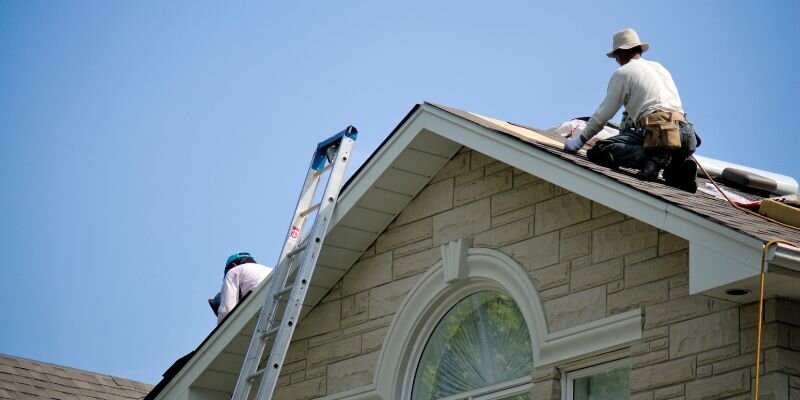
Understanding Unpermitted Work in Real Estate Transactions
When selling a house in Dayton, OH, it’s important to know about work that isn’t allowed. When buying or selling a house, “unpermitted work” means any changes or renovations that are made to the property without getting permission from the local building officials.
This can include everything from room extensions and finished basements to electrical and plumbing improvements that have not been inspected or approved by the city of Dayton. Unpermitted work can severely effect the sale process, as it may reduce the home’s market value and repel potential buyers who are scared of future liability issues.
Buyers usually do thorough checks, and if they find work that wasn’t allowed, they may ask for a lower price or demand that the sellers get permits for the work that wasn’t allowed before closing. There are some things that could go wrong, and sellers should be aware of them. They could tell the buyer about any work that they know isn’t allowed, try to get the necessary permits, or change their price to take these things into account.
Understanding how unpermitted work affects real estate transactions enables sellers to navigate the complexities involved effectively and ensures a smoother transaction process in Dayton’s competitive housing market.
Navigating Local Building Codes and Regulations in Dayton, Oh
Navigating local building codes and regulations in Dayton, OH, is a crucial step when selling a house with unpermitted work. Understanding the specific requirements set by the Dayton Building Inspection Division can help streamline the process and avoid potential pitfalls.
Sellers should start by conducting thorough research on the relevant building codes that apply to their property to ensure compliance. Consulting with local experts, such as real estate professionals familiar with Dayton’s regulations or experienced contractors who understand Ohio’s building standards, can provide valuable insights into what needs to be addressed before listing the property.
It may be necessary to obtain retroactive permits for any unpermitted work, which involves submitting detailed plans and undergoing inspections to verify safety and code compliance. Furthermore, addressing these issues upfront can prevent delays during negotiations or closing and enhance buyer confidence.
By taking care of these things ahead of time, buyers can improve their chances in Dayton’s real estate market and lower the legal risks that come with making changes or adding on without permission.
How to Identify Unpermitted Work Before Listing Your Home
When preparing to sell a house in Dayton, OH, it’s crucial to identify any unpermitted work before listing your property. Begin by meticulously reviewing the property’s history and existing documentation for any past construction or remodeling that might lack proper permits.
Be especially mindful of common locations where unauthorized work frequently takes place, such as garages, attics, or basements that may have been transformed into living areas without formal permission. A careful examination of these spaces is advised, with an eye out for any indications of unauthorized alterations, such as mismatched materials or unusual installations.
Consulting with a local real estate expert familiar with Dayton’s building codes can provide valuable insight into any discrepancies you might overlook. Additionally, hiring a licensed home inspector can help uncover hidden issues related to plumbing, electrical systems, or structural changes that were performed without permits.
Identifying unpermitted work early allows you to address potential problems proactively and ensures a smoother transaction when selling your home.
Legal Implications of Selling a House with Unpermitted Work

Selling a house with unpermitted work in Dayton, OH, involves navigating complex legal implications that homeowners must understand to avoid potential pitfalls. Unpermitted work refers to renovations or additions completed without obtaining the necessary building permits from the local authorities.
This can lead to significant challenges when selling your property. In Dayton, failing to disclose unpermitted work can result in legal liabilities for sellers, as Ohio law mandates full disclosure of known defects and issues that could affect the property’s value or safety.
Buyers may want repairs to be made or for sellers to get licenses for things that happened in the past, which can be expensive and take a lot of time. Also, lenders and insurance companies are often hesitant to finance or cover homes that have work done on them that isn’t allowed because of the higher risks that come with not following building codes.
To mitigate these legal risks, sellers are advised to consult with real estate attorneys familiar with local regulations and consider addressing any unpermitted work before listing their home on the market.
Disclosure Requirements for Sellers: What You Need to Know
In Dayton, Ohio, it is essential to comprehend disclosure rules when selling a home that has unpermitted work. Sellers are required by law to notify prospective purchasers of any known unpermitted work.
This includes remodeling or additions carried out without the required approvals. Full disclosure of the property’s condition is crucial because withholding it could have legal ramifications and cause the sale to fall through.
In Ohio, sellers must complete a Residential Property Disclosure Form, detailing any material defects, including those related to unpermitted modifications. Consulting with a real estate expert familiar with local regulations can ensure that all disclosures are accurate and compliant with Ohio laws, protecting both the seller and buyer from future disputes.
Providing comprehensive records of any work done on the property helps develop trust and makes the transaction go more smoothly.
Assessing the Risks: Unpermitted Work and Property Value in Dayton, Oh
When selling a house with unpermitted work in Dayton, OH, understanding the potential impact on property value is crucial. Unpermitted work can pose significant risks, as it may not comply with local building codes and regulations, potentially leading to safety concerns or legal issues.
Buyers are often wary of properties with unpermitted modifications due to the uncertainty surrounding future costs for bringing the work up to code or possible fines. In Dayton’s real estate market, homes with unpermitted work might face challenges during appraisal, which can affect financing options for potential buyers and ultimately influence the property’s marketability.
Sellers should carefully think about these things and decide if telling the buyers about the work that wasn’t allowed up front or getting permits after the fact could lower some of these risks, help keep or even raise the value of their home. It’s important to understand these factors if you want to make smart choices about how to sell a complicated home in Dayton’s competitive housing market.
The Impact of Unpermitted Work on Home Insurance Policies
When selling a house with unpermitted work in Dayton, OH, understanding the impact on home insurance policies is crucial. Unpermitted work can significantly complicate home insurance coverage, as insurers may view such properties as higher risks due to potential safety and compliance issues.
Before giving out or updating a policy, insurance companies often want to know about any work that isn’t allowed. If this information is kept secret, it could cause claims to be denied or policies to be canceled, especially if the unauthorized changes are found to have caused damage or loss.
Sellers should be aware that buyers might face challenges securing favorable insurance terms if the property has substantial unpermitted alterations. This situation can influence negotiations and potentially affect the property’s market value.
Before putting the house up for sale, Dayton sellers may want to think about getting retroactive permits or speaking with a professional to determine how the unpermitted work affects their current insurance policy and how to fill in any coverage gaps.
Financing Challenges: Mortgages and Loans on Houses with Code Violations
Financing issues can have a big influence on the transaction process when selling a home in Dayton, Ohio that has unpermitted work or code violations. Because lenders are generally reluctant to finance residences that do not conform with local building rules, mortgages and loans on such properties sometimes encounter obstacles.
These code violations pose a risk for both buyers and financial institutions, as they may lead to costly repairs or legal issues down the line. Buyers seeking conventional loans might struggle to secure financing unless the seller addresses these issues beforehand.
In some cases, FHA or VA loans may also be difficult to obtain due to their strict property standards. Sellers might consider offering incentives like repair credits or price reductions to attract cash buyers who aren’t reliant on traditional financing methods.
Sellers must reveal any unauthorized work in advance and contemplate engaging a seasoned real estate professional well-versed in the intricacies of Dayton’s home market.
Effects of Unpermitted Renovations on Marketability and Sale Price
Unpermitted renovations can significantly impact the marketability and sale price of a house in Dayton, OH. Buyers often view unpermitted work as a red flag, leading to concerns about the quality and safety of the modifications.
This apprehension can decrease buyer interest and reduce competitive offers. Lenders may also hesitate to finance properties with unpermitted renovations due to potential legal liabilities or insurance complications, further limiting the pool of prospective buyers.
If buyers don’t have the right permits, they may break the law and have to fix it before the closing, which could add to the costs and delay the sale. Also, appraisers may lower the value of a home if they find work that wasn’t allowed to be done on it, which can lower the end sale price.
Homeowners who are thinking about selling should know that taking proactive measures to fix these problems can improve the appeal of their house and increase its market value.
Steps to Rectify Unpermitted Construction Before Selling
When preparing to sell a house with unpermitted work in Dayton, Ohio, addressing the issue of unpermitted construction is crucial. The first step involves consulting with a knowledgeable local real estate professional who understands the Dayton market and can provide insights into how unpermitted work might affect your home sale.
After that, think about employing a certified inspector or contractor to fully evaluate the scope of any unauthorized alterations. This assessment will assist you in deciding if it is practical to apply for retroactive permits from the local building authority or whether the necessary adjustments must be made.
Engaging with Dayton’s building authorities early on can facilitate smoother negotiations when applying for retroactive permits, as they may offer guidance on bringing the work up to code. If obtaining permits isn’t practical, it might be strategic to disclose all known issues transparently with potential buyers and adjust your pricing accordingly.
Future liabilities can be decreased by ensuring that all disclosures are compliant with the law by speaking with an attorney knowledgeable about Ohio real estate laws. By being proactive, sellers can maximize their property’s value to potential purchasers while successfully navigating the challenges of selling a Dayton house with unpermitted construction.
Cost-benefit Analysis: Fixing vs. Selling As-is with Unpermitted Work
A comprehensive cost-benefit analysis is essential when selling a home in Dayton, Ohio that has unpermitted work done on it. This helps determine whether to repair the problems or sell the property as is. It can be expensive and time-consuming to fix unpermitted construction because it frequently requires getting permissions, employing contractors, and sometimes going through inspections.
On the other hand, selling the house as-is might attract buyers looking for a bargain but could result in a lower sale price due to perceived risks and necessary future repairs. Homeowners must weigh the expense and effort of bringing the property up to code against the potential financial hit from selling under market value.
Understanding local real estate trends in Dayton and consulting with experts can provide valuable insights into how these choices might impact your final profit margin.
Negotiation Strategies When Dealing with Unpermitted Work

When selling a house in Dayton, OH, with unpermitted work, effective negotiation strategies are crucial to ensure a successful transaction. Begin by transparently disclosing the unpermitted work to potential buyers right from the start.
This openness can build trust and prevent future disputes. Consider obtaining estimates for bringing the work up to code, as this information can be valuable during negotiations and may help justify your asking price or any concessions you might offer.
Buyers will probably use the unpermitted work as a bargaining chip to get a lower price, so be ready to fight back with market comparables and proof of the property’s total value. You could also offer buyers credits toward closing costs or an escrow holdback that pays for code compliance changes after the sale. This will reassure buyers and protect your interests.
Engaging a real estate professional who specializes in properties with unpermitted work can provide additional insights and negotiation expertise specific to Dayton’s housing market dynamics.
Exploring Buyer Options for Homes with Unpermitted Additions
If you’re selling a house in Dayton, OH that has work or additions that aren’t allowed, you should look at all of your buyer choices to make sure the deal goes smoothly. One good option is to go after cash buyers. These people usually have more freedom and are willing to buy homes as-is, since they don’t need to follow strict building rules for traditional financing.
Additionally, real estate investors can be particularly appealing since they are typically experienced in handling renovations and may see the potential value in unpermitted spaces. Marketing the property as an investment opportunity can attract these types of buyers.
You could also sell to people who want to fix up houses and are willing to go through the approval process themselves after the sale. During showings and talks, it’s important to be honest about any additions that aren’t allowed. Being open can build trust and possibly speed up the sale process.
Highlighting any unique features or benefits of the unpermitted work, such as additional living space or enhanced amenities, can also draw interest from those willing to take on some extra work after closing.
Evaluating Potential Buyers’ Concerns Regarding Non-compliant Structures
When selling a house with unpermitted work in Dayton, OH, it’s crucial to understand and address potential buyers’ concerns about non-compliant structures. Buyers may worry about the legal implications of purchasing a home with unpermitted additions or renovations, fearing future liabilities or costly fines.
They might also be concerned about the structural integrity and safety of these modifications, questioning whether they meet building codes and standards. To alleviate these worries, sellers should provide as much information as possible about the unpermitted work, including any documentation or history of the changes made.
Offering transparency can help build trust with buyers and demonstrate that the seller is committed to resolving any issues related to permits. Additionally, sellers might consider obtaining an inspection by a licensed professional to assess the quality and condition of the unpermitted structures.
Addressing these concerns proactively can significantly enhance buyer confidence and facilitate a smoother transaction process in Dayton’s real estate market.
Preparing a Comprehensive Property Inspection Report for Buyers
When selling a house in Dayton, OH that has unpermitted work done on it, it is important to make a thorough property inspection report to draw potential buyers and be honest. This in-depth report should include a full evaluation of the property’s state, pointing out both authorized and unapproved work to give buyers a clear picture of what to expect.
An experienced inspector can help identify any safety concerns or code violations associated with the unpermitted work, offering expert advice on necessary improvements or repairs. By documenting every aspect of the home, from structural integrity to electrical systems and plumbing, sellers can build trust with buyers who might be wary of purchasing a home with unpermitted modifications.
Professional photos and details in the report also add value because they help potential buyers see how the property could be used while also giving them all the information they need about how it is now. By being honest about problems that already exist, you not only lower your risk, but you also make it easier to negotiate a price that works for everyone.
How Agents Can Assist with Properties Having Unpermitted Work
Real estate professionals play a crucial role in navigating the complexities of selling a house with unpermitted work in Dayton, OH. These professionals possess the expertise needed to evaluate the potential impact of unpermitted modifications on property value and marketability.
By doing thorough inspections, agents can help homes decide whether to apply for retroactive permits or tell potential buyers about problems directly. Because they know the local rules and building codes, they can help buyers deal with the complicated legal issues that come up when work is done without permission.
Additionally, agents can leverage their network of contractors and inspectors to help address any necessary repairs or modifications, ensuring that properties meet buyer expectations. With their negotiation skills, they assist in setting realistic pricing strategies that reflect both the home’s condition and market trends. For sellers seeking a faster route, working with a cash for houses company in Brookville can offer a straightforward alternative—eliminating the need for repairs, showings, or drawn-out negotiations.
At the end of the day, real estate professionals make deals go more smoothly and lower the risks that come with selling homes, such as making changes without permission.
Case Studies: Successful Sales Despite Unpermitted Construction Issues
Navigating the sale of a house with unpermitted work in Dayton, OH, can seem daunting, but several case studies highlight successful strategies. One notable example involves a homeowner who discovered an unpermitted basement renovation during the pre-sale inspection process.
The seller was able to negotiate a reasonable price for the house by being honest with potential purchasers about the work that needed to be done and getting estimates for how much it would cost to bring it up to code. In another situation, a home with a deck that wasn’t allowed had problems until the owner hired local contractors to check the safety and structural integrity of the deck.
Armed with detailed reports and cost estimates, they successfully reassured buyers about potential liabilities. Another effective approach involved emphasizing other desirable features of the home while transparently addressing the unpermitted additions.
Even though regulators were worried, sellers were able to get people interested by emphasizing the benefits of the location and the unique design features of the home. These examples show that being honest and negotiating well can help you make a deal, even when there are problems with building without a permit in Dayton’s real estate market. For guidance tailored to your situation, contact us—we’re here to help you navigate these challenges with confidence.
Legal Recourse for Buyers After Discovering Hidden Code Violations

When buyers discover hidden code violations after purchasing a house in Dayton, OH, they have several legal recourses available to address these unpermitted issues. First and foremost, buyers should review their purchase agreement to identify any clauses related to undisclosed defects or unpermitted work.
Talking to a real estate lawyer can help you understand if you have a claim against the seller for misrepresentation or breach of contract. In Ohio, sellers are legally expected to tell buyers about any known material flaws, such as work that wasn’t allowed. If they don’t, they could be held responsible.
Buyers might also consider filing a complaint with local housing authorities if the violations pose safety hazards or involve significant building code breaches. Mediation or arbitration could be viable options for resolving disputes without resorting to lengthy court battles.
Also, if the hidden violations have a big effect on the property’s value or ability to be lived in, it might be necessary to file a case to get paid. Hiring a skilled Dayton real estate lawyer is important for navigating these legal paths successfully and making sure you follow all local rules and laws.
Can I Sell My House If I Did Work Without Permits?
Selling a house with unpermitted work in Dayton, OH, can be challenging, but it is certainly possible with the right approach. If you have completed renovations or additions without obtaining the necessary permits, you may wonder, “Can I sell my house?” The answer is yes, but there are important factors to consider.
First, understand that unpermitted work can affect your home’s marketability and appraisal value. Potential buyers may be wary of purchasing a property with unpermitted modifications due to potential legal and safety issues.
It’s crucial to disclose any unpermitted work to prospective buyers upfront to maintain transparency and trust. Some strategies include negotiating with buyers about fixing the issues before closing or offering a credit towards future permitting costs.
Consulting with a real estate expert experienced in dealing with unpermitted work in Dayton can provide valuable insights into navigating local regulations and finding solutions that satisfy both parties involved in the transaction. With expert guidance and strategic planning, selling a home with unpermitted work is manageable and can still result in a successful sale.
Can You Sue a Seller for Unpermitted Work?
When considering whether you can sue a seller for unpermitted work on a property in Dayton, OH, it’s crucial to understand the legal implications and potential strategies involved. Unpermitted work refers to renovations or modifications made to a house without obtaining the necessary permits from local authorities.
As a buyer, discovering such work after purchasing a home can lead to significant issues, both financially and legally. In Ohio, if the seller failed to disclose unpermitted work as part of the mandatory property disclosure form, you may have grounds for legal action based on misrepresentation or fraud.
It’s essential to gather evidence of the unpermitted work and consult with an experienced real estate attorney who understands Ohio’s property laws. They can guide you through the process of seeking compensation or remediation from the seller.
Additionally, understanding local building codes and regulations is vital in assessing your situation accurately. While pursuing legal action can be complex, it is sometimes necessary to protect your investment and ensure compliance with Dayton’s housing standards.
What If You Buy a House with Unpermitted Work?
When you buy a house with unpermitted work in Ohio, it’s crucial to understand the potential challenges and implications. Unpermitted work refers to renovations or additions completed without obtaining the necessary permits from local authorities.
This can lead to several issues, including safety concerns, non-compliance with building codes, and difficulties during resale. As a homeowner in Dayton, addressing unpermitted work promptly can prevent complications such as fines or mandatory removal of the offending structures.
Consulting with a real estate attorney or an experienced contractor is advisable to assess the situation accurately. They can guide you through legalizing the unpermitted work by obtaining retroactive permits or modifying the structure to meet current codes.
Additionally, negotiating with sellers for compensation or repairs before finalizing your purchase could be beneficial. Understanding these aspects ensures that buying a house with unpermitted work becomes manageable rather than overwhelming. If you’re looking for a hassle-free solution, we buy houses in Bellbrook—even those with unpermitted work—making the process quicker and less stressful for sellers
| REALTOR | BLUEPRINTS | MORTGAGE LENDERS | TAXES | TAX | |
| MONEY | HOME IMPROVEMENT | HOME RENOVATIONS |
